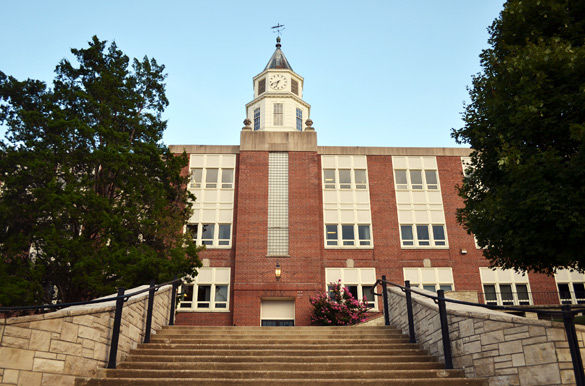University officials address financial situation with faculty

Daily Egyptian file photo
April 13, 2017
University officials met with faculty members Thursday afternoon to answer questions about SIU’s financial situation and concerns about budget cuts amid a state budget crisis that is approaching the two-year mark.
Illinois public universities have received no appropriation outside of stop-gap funding during the Springfield stalemate between Republican Gov. Bruce Rauner and a Democratic-controlled assembly. The conversation focused on several of the university’s recent announcements that have the potential to affect the university’s faculty, staff and students — including possible layoffs, the discontinuation of academic programs and the appointment of a permanent chancellor to lead the Carbondale campus.
Special meeting
Advertisement
SIU President Randy Dunn said the SIU Board of Trustees will have a special meeting in May to approve a permanent chancellor hire, at which point the board will discuss declaring a financial emergency at Carbondale and allowing the cash-strapped university to borrow from SIU-Edwardsville to continue daily operations.
The university president said he expects the item will be approved, but it is still possible to get the loan without the board’s go-ahead.
“I don’t think that’s the best way to approach it, but there is that trap-door if we need it,” Dunn said.
Board of Trustees members at their April 6 meeting voted not to discuss the matter. One board member dissented and unanimous approval was required.
Analysis of the university’s finances indicates the Carbondale campus could fall into deficit spending within one or two months. When asked what would happen if the university did fall into deficit spending, Dunn said it would have little impact on day-to-day campus operations, but SIU would be “in the red” on paper.
The major effect would be from the university’s accrediting body. Dunn said if SIU started deficit spending, it would be a “trip-wire” that might cause Higher Learning Commission accreditors to more closely examine the university’s ability to remain operational.
Academic prioritization
Advertisement*
Interim Provost Susan Ford gave an update on the academic program prioritization process, which uses metrics originally designed by a joint task force she appointed to evaluate the university’s degree programs.
Ford said it would be fairer for groups of faculty members to evaluate the responses because the data she received are so subjective.
“When I was a faculty member, I would never have trusted any provost to make these kinds of decisions,” Ford said. “I personally believe this will be more appropriate.”
Ford said even if a program is closed from the prioritization process, the Higher Learning Commission requires the university to teach any students that have been admitted until they receive the degrees they applied for.
“We close programs all the time, but those decisions are generally made at the faculty-level,” Ford said. “What we would be talking about is an accelerated rate of program closure, and some closure decisions that might be made at the higher level.”
Ford said once she gets faculty volunteers to do the evaluations, she hopes to release a report in mid-May.
Student recruitment
Susan Davenport, associate dean for students and curricular affairs in the College of Liberal Arts, said the state budget impasse is affecting the university’s ability to recruit students.
Ford agreed, saying parents are telling their children not to come to Illinois for college right now.
“We are swimming against a tsunami of bad press from the state budget crisis,” Ford said. “It harmed us last year, and we know it’s harming us this year.”
Compared to the financial health of other state universities, Dunn said SIU falls in the middle of the pack. Eastern Illinois University, Western Illinois University and Chicago State University have all declared financial emergency, but Dunn said the University of Illinois system would likely be able to sustain operations indefinitely despite the budget impasse.
Ford said the university is watching student orientation registration closely to try to predict enrollment and the effectiveness of recruitment efforts.
Legal action
Dunn addressed questions about the possibility of Illinois public universities taking legal action against the state for failing to pass a budget.
He said they had collectively researched whether they are able to sue the state, but since universities are viewed as state agencies, they can’t go after payments in court the same way vendors can.
“Still, we’re doing what we can without crossing a partisan line,” Dunn said. “We stay in constant contact with legislators, we write editorial boards — at some point, it falls on the elected officials to champion higher education.”
Vacant positions
In Dunn’s March 29 System Connection — the column he emails to faculty and staff — the university president said the Carbondale campus should cut at least $30 million in spending with the assumption a state budget would not be forthcoming soon.
In response, interim Chancellor Brad Colwell’s office identified $19 million in immediate, permanent budget reductions. Of these cuts, Colwell said about 4 percent would come from the office of interim Provost Susan Ford, who coordinates and prioritizes academic programs.
Ford said none of that amount would include cuts to academic positions; reductions would instead come from student wages, equipment, travel services and non-academic positions.
The university will leave an estimated 158 vacant positions unfilled to “minimize the number of layoffs,” according to the chancellor’s message in March. Since the budget impasse began, the university has let 293 positions go unfilled. All vacant salary funds will be consolidated into a central account to provide “more flexibility in filling positions where the needs are greatest, regardless of a department’s ability to fund a position within its own budget.”
Because these teaching positions will remain vacant, Ford said her office told deans two weeks ago they needed to look at their class offerings for the fall semester and cancel electives where possible to “reinvest” remaining faculty to teach required courses.
“My priority is to staff classes that need to be staffed,” Ford said. “We will do that as quickly as we can so students don’t sign up for classes that don’t end up being offered.”
Physical plant operations
Colwell’s reduction plan also included saving $1.5 million in plant and service operations by outsourcing and reducing operational costs. A committee within plant and service operations is currently looking into outsourcing, Colwell said at Thursday’s meeting.
Dunn said doing so would require careful cost calculations to figure out how much could really be saved, because he said every trade service needs to be considered differently.
He said painting services on campus could be addressed by outside firms more easily than electrical or plumbing issues, which often require immediate responses.
“As long as we’ve got firms we can call at three in the morning, we could do it, but you pay a premium for that,” Dunn said. “When you need plumbers, you need them now.”
Non-instructional cuts
Colwell said implementing the findings of non-instructional program prioritization committee is about one-third complete.
The non-instructional program review, which a chancellor-appointed committee released in January, was meant to identify long-term efficiencies like switching to direct deposit payments for vendors and cutting centers or initiatives “that should be self-supporting.”
Before the end of the semester, Colwell said he will send an update on the reductions to non-instructional units on campus.
Administrative transparency
Dave Johnson, president of the Faculty Association, asked why the administration doesn’t communicate more with students about the financial crisis the university is facing.
“We’re talking to students,” Johnson said, referring to SIU faculty members. “If you’re not going to communicate with them, what should we tell them?”
Colwell said he has been waiting until he has more specific details to give them outside of numbers and percentages about budget cuts, but will be meeting with the Undergraduate Student Government and Graduate and Professional Student Council in the coming weeks to address the issue.
“Students want to know if their program will be here, if the Rec Center will have the same hours, will the library still be open,” Colwell said. “Those are things that, once we get a better hold on them, we can give answers.”
The chancellor said he often gets questions about why events and construction are still taking place on campus when the university is under such financial duress, but he said it is important to understand those things are often funded privately.
“Therein does lie a problem, because some of you have more non-state dollars than others,” Colwell said. “But we’re trying to be very careful not to send the wrong message.”
Staff writer Marnie Leonard can be reached at [email protected] or on Twitter @marsuzleo.
To stay up to date with all your SIU news, follow the Daily Egyptian on Facebook and Twitter.
Advertisement







